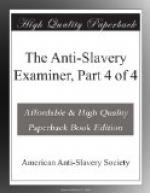The Savior has himself taught us how this doctrine must be applied. He bids us improve every opportunity and employ every power, even through the most menial services, in blessing the human family. And to make this lesson shine upon our understandings and move our hearts, he embodied in it a most instructive and attractive example. On a memorable occasion, and just before his crucifixion, he discharged for his disciples the most menial of all offices—taking, in washing their feet, the place of the lowest servant. He took great pains to make them understand, that only by imitating this example could they honor their relations to him as their Master; that thus only would they find themselves blessed. By what possibility could slavery exist under the influence of such a lesson, set home by such an example? Was it while washing the disciples’ feet, that our Savior authorized one man to make a chattel of another?
To refuse to provide for ourselves by useful labor, the apostle Paul teaches us to regard as a grave offence. After reminding the Thessalonian Christians, that in addition to all his official exertions he had with his own muscles earned his own bread, he calls their attention to an arrangement which was supported by apostolical authority, “that if any would not work, neither should he eat.” In the most earnest and solemn manner, and as a minister of the Lord Jesus Christ, he commanded and exhorted those who neglected useful labor, “with quietness to work and eat their own bread.” What must be the bearing of all this upon slavery? Could slavery be maintained where every man eat the bread which himself had earned?—where idleness was esteemed so great a crime, as to be reckoned worthy of starvation as a punishment? How could unrequited labor be exacted, or used, or needed? Must not every one in such a community contribute his share to the general welfare?—and mutual service and mutual support be the natural result?
The same apostle, in writing to another church, describes the true source whence the means of liberality ought to be derived. “Let him that stole steal no more; but rather let him labor, working with his hands the thing which is good, that he may have to give to him that needeth.” Let this lesson, as from the lips of Jehovah, be proclaimed throughout the length and breadth of South Carolina. Let it be universally welcomed and reduced to practice. Let thieves give up what they had stolen to the lawful proprietors, cease stealing, and begin at once to “labor, working with their hands,” for necessary and charitable purposes. Could slavery, in such a case, continue to exist? Surely not! Instead of exacting unpaid services from others, every man would be busy, exerting himself not only to provide for his own wants, but also to accumulate funds, “that he might have to give to” the needy. Slavery must disappear, root and branch, at once and forever.




